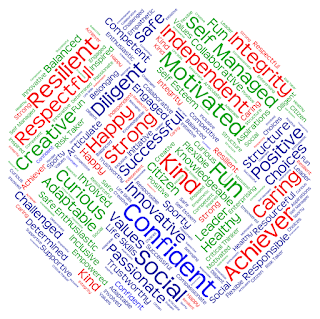Blurring the lines - my exciting term with Year 9 Science
You may have seen from a previous post that we have been working towards aligning our junior curriculum across the 'core subjects' to offer more opportunity for cross-curricular learning. At the whole school level, we assigned themes to terms. This gentle approach allowed for buy in, and buy out.
An English teacher and I, who teach the same class, decided to buy in. It started with conversations over morning tea (it helps that we tend to gravitate towards each other in the staff room). Innocuous conversations around "What are you doing with 9xx at the moment?" On one fortuitous day, we could see a link, she was doing poetry, I was doing planets, and she suggested they do poems about planets. She had a cool example of a Magic Box poem lesson, and wanted students to be imaginative about what it might be like to be on the planet. They got to work on their poems in both English and Science, and thought that was pretty cool, as they got to ask us both questions. We even managed to pop in each other's classes.
We were on a roll, and I was next moving on to whether or not humans should see the colonisation of Mars as a solution to Earth's over-population issues. That topic in itself excited me, as it is the first time we have contextualised our science teaching at such depth. The science learning outcomes within this context were the usual Year 9 science culprits - what is a terrestrial planet, conditions on other planets, what we'd need survive there.... We were analysing the Mars One mission, which was timely given the release of articles reporting the selection of the final 100 candidates. This time, we even created a shared Google Doc for the lessons that flowed from the activities in Science, to those that would be continued in English, where students wrote a formal piece of writing in response to a text, which they had critically analysed in Science. When asked how they found the cross-curricular experience, 72% of the class responded positively, saying that they found it helpful, natural and enjoyable. The other 28% were indifferent, but not negative towards the experience.
I has been a long time since I've been this excited about learning, which is saying a lot, because I'm usually quite excited!
You can find an overview of our whole unit here. Feel free to share and use.
Next term is looking just as, if not more, exciting. I am in the process of re-writing our extended abstract learning outcomes to suit the film study (Remember the Titans) being done in English, and our social studies comrade is thinking about coming on board with cultural diversity. As a Year 9 Science teaching group, we are also looking at whether we ourselves will be more diverse, and change the extended abstract learning outcomes to suit each class. This would result in us not having 'common assessments' (but surely they're common if the bottom line we are assessing Material World at Level 5 etc etc - but that's a whole different blog post!)
We were on a roll, and I was next moving on to whether or not humans should see the colonisation of Mars as a solution to Earth's over-population issues. That topic in itself excited me, as it is the first time we have contextualised our science teaching at such depth. The science learning outcomes within this context were the usual Year 9 science culprits - what is a terrestrial planet, conditions on other planets, what we'd need survive there.... We were analysing the Mars One mission, which was timely given the release of articles reporting the selection of the final 100 candidates. This time, we even created a shared Google Doc for the lessons that flowed from the activities in Science, to those that would be continued in English, where students wrote a formal piece of writing in response to a text, which they had critically analysed in Science. When asked how they found the cross-curricular experience, 72% of the class responded positively, saying that they found it helpful, natural and enjoyable. The other 28% were indifferent, but not negative towards the experience.
I has been a long time since I've been this excited about learning, which is saying a lot, because I'm usually quite excited!
You can find an overview of our whole unit here. Feel free to share and use.
Next term is looking just as, if not more, exciting. I am in the process of re-writing our extended abstract learning outcomes to suit the film study (Remember the Titans) being done in English, and our social studies comrade is thinking about coming on board with cultural diversity. As a Year 9 Science teaching group, we are also looking at whether we ourselves will be more diverse, and change the extended abstract learning outcomes to suit each class. This would result in us not having 'common assessments' (but surely they're common if the bottom line we are assessing Material World at Level 5 etc etc - but that's a whole different blog post!)

Hi Mel, just stumbled upon your post. I am currently starting to apply SOLO to schemes and your Globalisation task has been a great help (as well as your L3 documents on Pond) so thanks for that. It seems like a good model to start the thinking towards curriculum integration as you are doing above.
ReplyDeletethanks
Mike